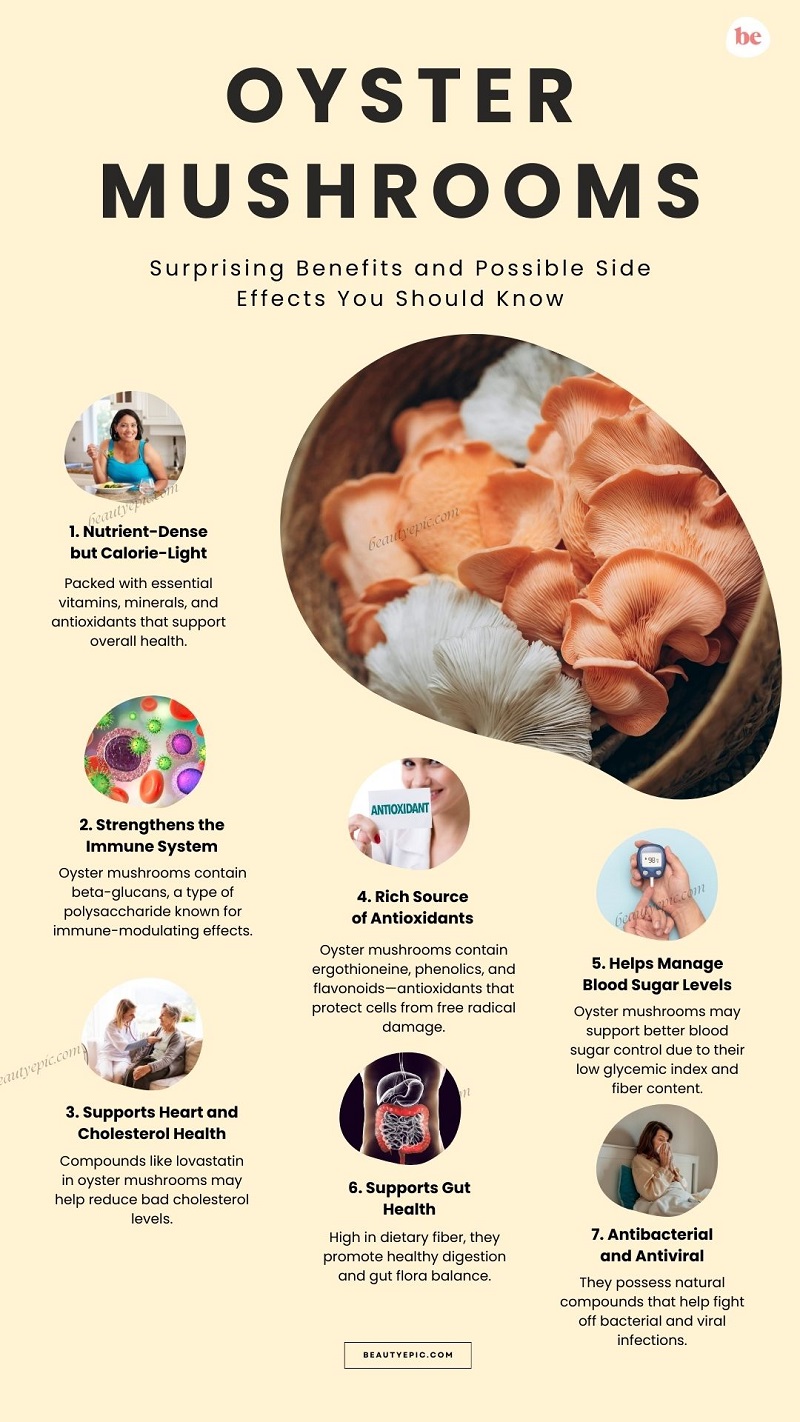
Important: This article is for informational purposes only. Please read our full disclaimer for more details.
Mushrooms have fascinated both chefs and health enthusiasts for centuries, and oyster mushrooms (Pleurotus ostreatus) are among the most popular varieties. Known for their delicate oyster-shaped caps and mild, earthy flavor, these mushrooms aren’t just a treat for the taste buds—they are also packed with nutrients and potential health benefits. However, like many natural foods, oyster mushrooms may have some side effects that are worth considering.
7 Amazing Health Benefits of Oyster Mushrooms
1. Nutrient-Dense but Calorie-Light
Oyster mushrooms are an excellent low-calorie superfood. A 100-gram serving typically provides:
- 3–4 g of protein
- 2 g of dietary fiber
- B vitamins (B1, B2, B3, folate)
- Essential minerals like potassium, phosphorus, iron, and selenium
Because they’re nutrient-rich and fat-free, oyster mushrooms are a great option for people seeking weight control without sacrificing nourishment.
2. Strengthens the Immune System
Oyster mushrooms contain beta-glucans, a type of polysaccharide known for immune-modulating effects. These compounds stimulate macrophages (immune cells that fight infections) and enhance the body’s defense mechanisms.
A study in the Journal of Medicinal Food (2011) confirmed that beta-glucans from oyster mushrooms enhance immune responses in animal models, suggesting potential benefits for humans in fighting colds, flu, and other infections (1).
3. Supports Heart and Cholesterol Health
One standout component of oyster mushrooms is lovastatin, a naturally occurring statin-like compound. Lovastatin helps reduce LDL (“bad”) cholesterol while supporting HDL (“good”) cholesterol levels.
Research published in the International Journal of Cardiology (2012) found that participants consuming oyster mushrooms regularly experienced improved lipid profiles and reduced cardiovascular risk factors (2)(3).
By lowering cholesterol and providing potassium, which helps regulate blood pressure, oyster mushrooms play a dual role in cardiovascular wellness.
4. Rich Source of Antioxidants
Oyster mushrooms contain ergothioneine, phenolics, and flavonoids—antioxidants that protect cells from free radical damage.
Antioxidants play a crucial role in reducing the risk of chronic conditions, including heart disease, diabetes, and neurodegenerative disorders. Regular consumption also slows down premature aging and supports overall cellular health.
5. Helps Manage Blood Sugar Levels
Oyster mushrooms are a good dietary choice for people with prediabetes or type 2 diabetes.
A 2015 clinical trial published in PLoS One showed that participants consuming oyster mushrooms experienced lower fasting blood sugar levels and improved insulin sensitivity (4).
The fiber and beta-glucans present in oyster mushrooms slow carbohydrate absorption, preventing sudden spikes in blood sugar.
6. Potential Anti-Cancer Properties
Several laboratory studies suggest that oyster mushrooms may inhibit the growth of cancer cells. Extracts from these mushrooms contain compounds like pleuran and lectins, which have shown anti-tumor effects in test-tube and animal studies.
For instance, a 2016 study in the International Journal of Oncology reported that oyster mushroom extracts induced apoptosis (programmed cell death) in breast and colon cancer cell lines (5).
However, while these results are promising, more large-scale human trials are required before oyster mushrooms can be considered a therapeutic cancer intervention.
7. Gut-Friendly and Antimicrobial Effects
The fiber in oyster mushrooms acts as a prebiotic, feeding beneficial gut bacteria and promoting digestive health.
Additionally, oyster mushrooms possess natural antimicrobial properties. Laboratory research has found they can inhibit the growth of certain harmful bacteria, including E. coli and Staphylococcus aureus. This suggests they may offer mild protective effects against infections.
Side Effects of Oyster Mushrooms
While oyster mushrooms are generally safe and healthy, there are some important risks to consider:
1. Allergic Reactions
Some people may experience skin rashes, itching, or respiratory distress after consuming oyster mushrooms.
Inhalation of mushroom spores during cultivation or cooking has been linked to “mushroom worker’s lung”, a respiratory allergy condition.
2. Digestive Upset
Eating oyster mushrooms in large amounts can cause bloating, gas, stomach cramps, or diarrhea, especially in people with sensitive digestion.
Undercooked or raw oyster mushrooms are harder to digest and may worsen symptoms.
3. Drug Interactions
Because oyster mushrooms naturally help lower cholesterol and blood sugar, they may amplify the effects of prescription medications like statins, insulin, or oral hypoglycemics.
This can lead to dangerously low cholesterol or blood sugar levels if not monitored properly.
4. Heavy Metal Accumulation
Mushrooms, including oyster mushrooms, tend to absorb heavy metals (like lead, cadmium, or mercury) from their growing environment.
Consuming mushrooms from polluted soil or contaminated sources may pose a long-term health risk.
5. Storage and Spoilage Risks
Oyster mushrooms have a short shelf life and spoil quickly. Spoiled mushrooms may cause food poisoning, nausea, or vomiting.
Always store them in a paper bag in the refrigerator and consume within a few days of purchase.
Frequently Asked Questions (FAQ’S)
1. Can I eat oyster mushrooms every day?
A. Yes, oyster mushrooms can be consumed daily in moderate amounts as part of a balanced diet, but variety in your diet is always recommended.
2. Are oyster mushrooms safe for children?
A. Yes, when cooked properly, oyster mushrooms are safe for children. However, introduce them gradually to check for any allergic reactions.
3. How should I cook oyster mushrooms to retain nutrients?
A. Light sautéing, steaming, or stir-frying preserves most nutrients. Avoid overcooking, which may reduce their antioxidant content.
Oyster mushrooms are more than just a tasty ingredient; they’re nutrient-rich, immune-boosting, and supportive of heart and metabolic health. Backed by growing scientific evidence, these mushrooms offer impressive health benefits. Still, like any natural food, they should be eaten in moderation, and individuals with allergies or chronic health conditions should consult a healthcare professional before regular consumption.
















